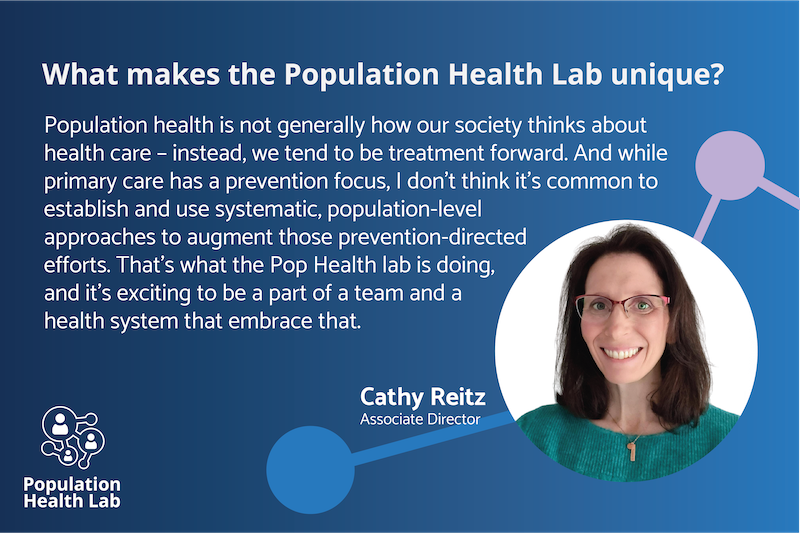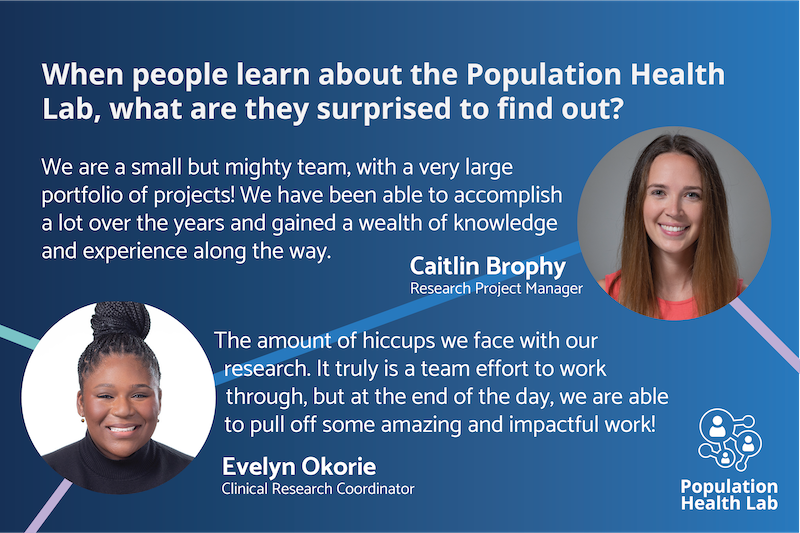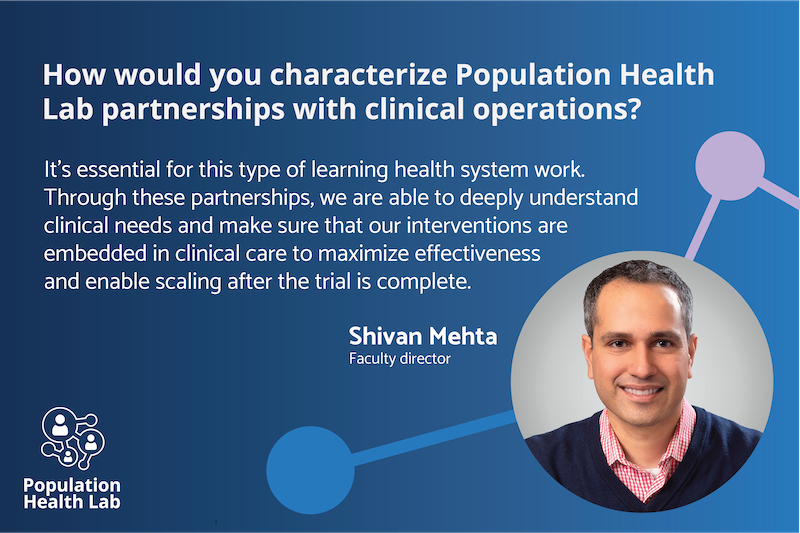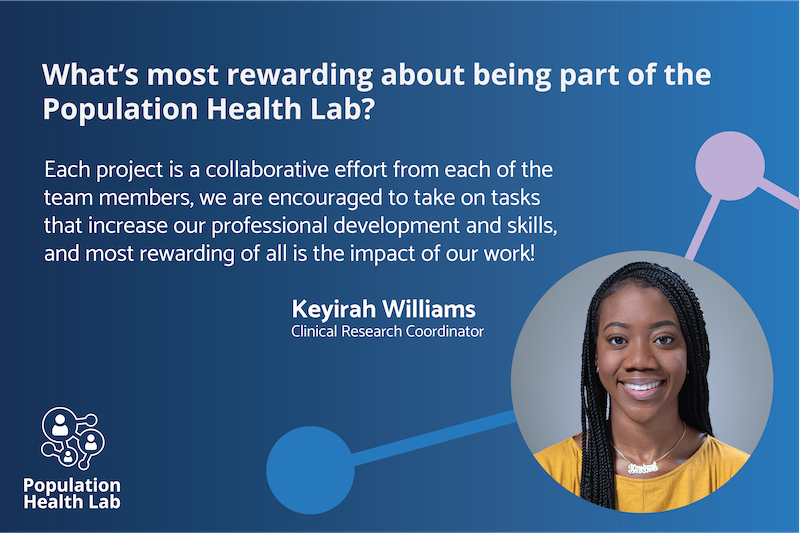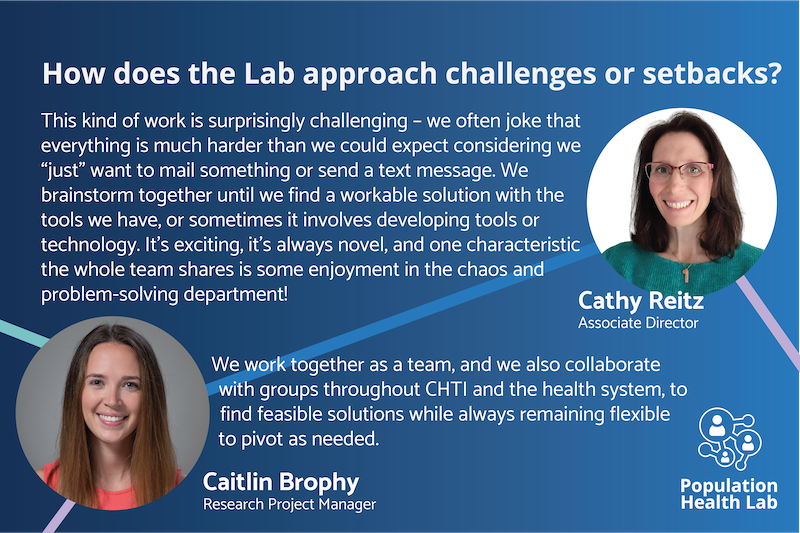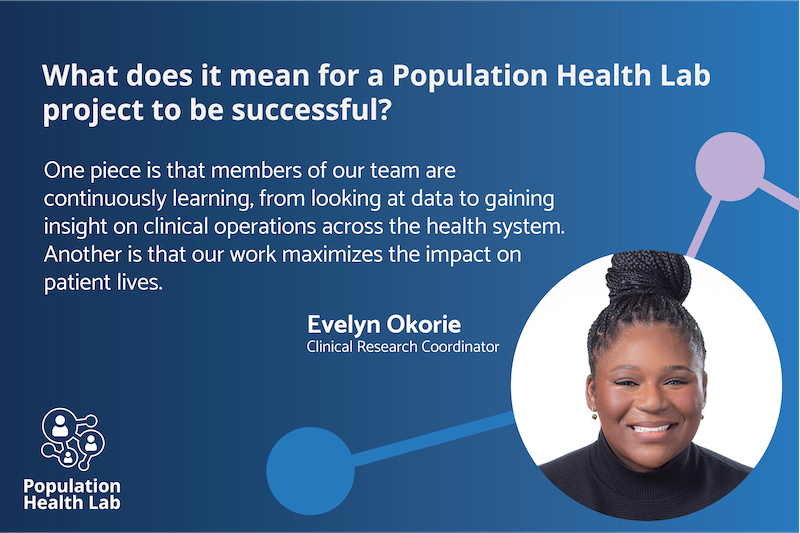The Population Health Lab: Multiplying impact in preventive and chronic care

Clinicians and health systems often grapple with how to help patients adhere to evidence-based guidelines for health-forward activities such as preventive screenings and vaccinations. At Penn Medicine, there’s a team dedicated to finding approaches that work – and work at scale: the Population Health Lab (PHL), situated in the Center for Health Care Transformation and Innovation. PHL seeks to improve health on a population level by partnering with clinicians and administrators to design sustainable interventions, evaluate them in pragmatic trials, and widely deploy the ones that prove effective.
Led by Shivan Mehta, MD, MBA, MSHP, associate chief innovation officer at Penn Medicine, and powered by a small research team, PHL has touched nearly 200,000 patient lives – and counting – in the studies they’ve conducted. Their growing portfolio spans efforts to prevent or manage several types of cancer, hepatitis C, influenza, and hypertension.
Solutions infused with behavioral science
Many of the Lab’s projects involve nudging people toward care regimens that satisfy evidence-based guidelines. To drive better outcomes, the team applies strategies gleaned from behavioral economics. These strategies can be directed at patients, clinicians, or both.
One technique is opt-out framing, which sets individuals on the recommended path by default instead of requiring the effort to opt in. PHL has used opt-out approaches – specifically, mailing patients a pre-signed order slip for a test or an at-home test kit – to double or triple screening rates for colorectal cancer (CRC), hepatitis C (HCV), and liver cancer among eligible patients. On the clinician side, they found that adding an HCV screening order to the default admissions order set nearly doubled the HCV screening rate among at-risk hospitalized patients.
New PHL studies are examining other strategies. In the BE IMMUNE trial, clinicians are regularly notified about their patient flu vaccination rate and how it compares to their colleagues’ rates, a tactic known as peer comparison feedback. Another study is assessing how a simplified choice structure affects CRC screening. Patients in this trial are first presented with a colonoscopy option and, if the colonoscopy is declined or incomplete, subsequently given a fecal test option – a strategy called sequential choice.
The Lab also uncovers which interventions don’t lead to better outcomes, which can spare departments from unnecessary spending. For example, Mehta and his team discovered that fancier (and more expensive) packaging for at-home test kits didn’t improve CRC screening rates. They’ve also evaluated various behaviorally informed financial incentives, but in many cases the results haven’t supported the broader use of payments.
Innovations for the digital age
The ubiquity of digital technologies in homes and health care settings has meant new opportunities to interact with patients and providers. PHL initiatives often leverage these digital opportunities to redesign the way care is provided. Many use text messaging, which has given the team response rates that are higher and more equitable in terms of race/ethnicity and age groups, than the electronic patient portal yields.
With the HomeConnect+ trial, for example, the Lab and their collaborators used activity monitors and text messaging to remotely track the progress of patients who recently had hip or knee replacements. The program’s patients had a rehospitalization rate four times lower than that of patients who weren’t enrolled in HomeConnect+.
PHL also developed the text message–based program Coloprep to help patients prepare for an upcoming CRC colonoscopy screening. Coloprep, which sends instructions and reminders, reduces the burden on clinical staff by lowering the number of phone calls they place and field for this purpose. The program is now in place at three Penn Medicine locations.
Interventions implemented in the electronic health record can simplify processes, guide decision-making, and save time. These include default orders, as in the HCV screening project, and bulk orders, which the Lab has used for breast and colorectal cancer screening. Among the team’s latest projects is I-SCREEN, an ongoing multi-site trial testing how automated pended orders and clinician peer comparison feedback plus different text messaging strategies affect mammogram completion rates.
An emphasis on evidence
PHL’s evaluation method of choice is the pragmatic randomized controlled trial (RCT). RCTs – which incorporate control arms to permit comparison and randomization of participants to limit bias – are designed to provide high-quality evidence around the links between interventions and outcomes. Backed by rigorous testing, findings can be integrated more consistently and broadly into health care practice, contributing to better health, equity, and experience and supporting Penn Medicine’s efforts to embody a learning health system.
Notably, the Lab runs these studies within the framework of existing clinical operations, accounting for the constraints and opportunities that entails without slowing down operational imperatives.
“We work very closely with clinical operations because we want to make preventive health easier, not harder on patients or physicians,” says Cathy Reitz, MPH, associate director of PHL. “We want to ensure we’re contacting the appropriate patients at the appropriate time, so understanding clinical recommendations before we begin any project is key. We also want to incorporate our operations into existing workflows; whatever work we do should be enhancing the process, not hindering it. Ideally, neither patients nor physicians even recognize that what is happening is outside of or in addition to their standard care.”
The Lab has also used RCTs to vet and expand on the results of prior exploratory work. Take, for example, the Cancer Screening Resurgence project, an effort to ramp up screening rates after the COVID-19 pandemic eased and preventive care resumed. First, colleagues at the Center for Health Care Transformation and Innovation ran rapid, iterative pilots to find promising ways of communicating with patients and getting them to complete overdue screenings. PHL then took that work into a new phase, partnering with Penn Medicine Primary Care (PMPC) and the Department of Radiology to conduct RCTs that integrated the interventions into a centralized mammography outreach program. This effort touched tens of thousands of patients and led to significantly more completed screenings.
Corie Rhodes, MD, MPH, associate medical director of quality for PMPC, was a key collaborator on the project. “I've been really thankful for Shivan and Cathy and Caitlin – all the different people I've worked with from the innovation center,” she said. “They have elevated the quality of our work.”
Expanding impact
For PHL and the other groups in the Center for Health Care Transformation and Innovation, maximizing impact is a key goal.
“We want to ensure that as many patients as possible can benefit from the interventions that have positive outcomes,” says Mehta, adding that the Lab often allocates resources to projects until solutions have scaled effectively. The team also partners with community health centers and health systems outside Penn Medicine to implement interventions more broadly and reach underserved populations.
As of May 2024, the Lab has completed 23 pragmatic RCTs and has two more underway. In addition to receiving health system support, PHL studies are funded by federal grants and philanthropic gifts; Mehta and his team have been awarded more than $8 million to conduct population health research. The PHL team has published their findings in more than 20 peer-reviewed journal articles, building on a body of scholarship that informs health care delivery advancements internationally.
Learn more about the Population Health Lab on the Center for Health Care Transformation and Innovation website.
